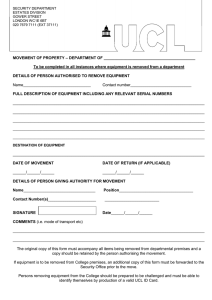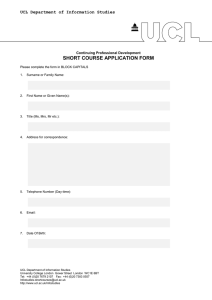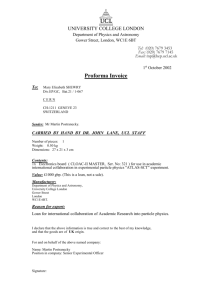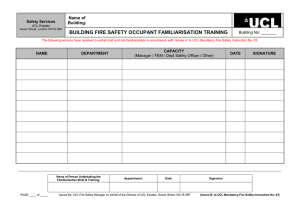OVERSEAS TRAVEL & CAMPING - FIRE SAFETY GUIDANCE safety’
advertisement
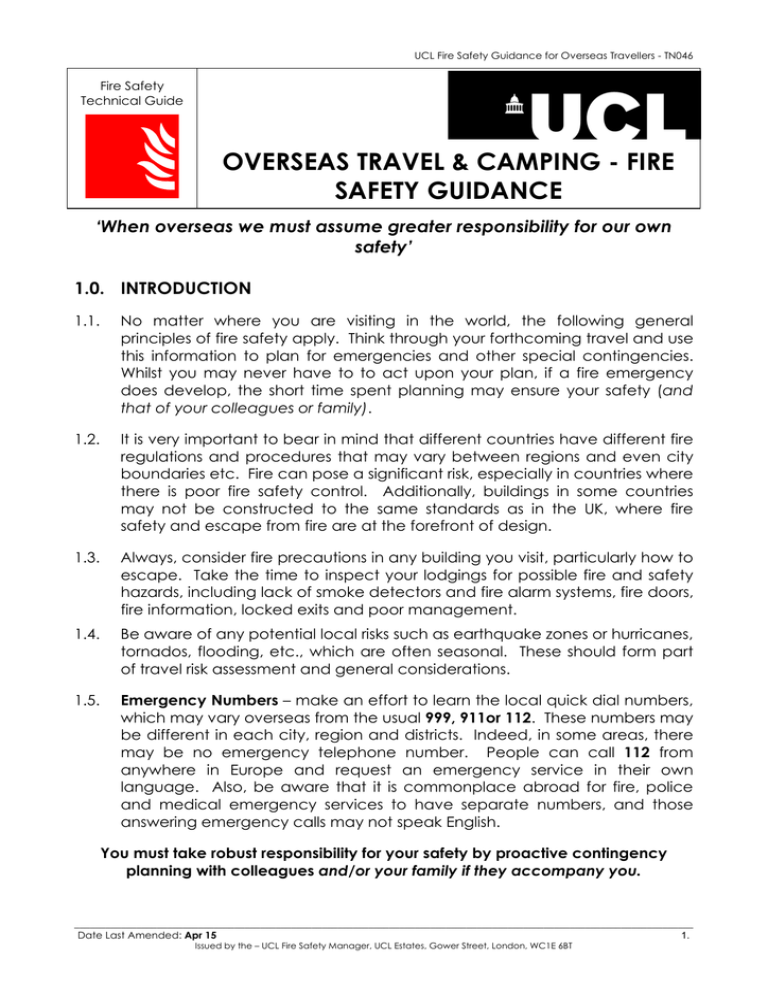
UCL Fire Safety Guidance for Overseas Travellers - TN046 Fire Safety Technical Guide OVERSEAS TRAVEL & CAMPING - FIRE SAFETY GUIDANCE ‘When overseas we must assume greater responsibility for our own safety’ 1.0. INTRODUCTION 1.1. No matter where you are visiting in the world, the following general principles of fire safety apply. Think through your forthcoming travel and use this information to plan for emergencies and other special contingencies. Whilst you may never have to to act upon your plan, if a fire emergency does develop, the short time spent planning may ensure your safety (and that of your colleagues or family). 1.2. It is very important to bear in mind that different countries have different fire regulations and procedures that may vary between regions and even city boundaries etc. Fire can pose a significant risk, especially in countries where there is poor fire safety control. Additionally, buildings in some countries may not be constructed to the same standards as in the UK, where fire safety and escape from fire are at the forefront of design. 1.3. Always, consider fire precautions in any building you visit, particularly how to escape. Take the time to inspect your lodgings for possible fire and safety hazards, including lack of smoke detectors and fire alarm systems, fire doors, fire information, locked exits and poor management. 1.4. Be aware of any potential local risks such as earthquake zones or hurricanes, tornados, flooding, etc., which are often seasonal. These should form part of travel risk assessment and general considerations. 1.5. Emergency Numbers – make an effort to learn the local quick dial numbers, which may vary overseas from the usual 999, 911or 112. These numbers may be different in each city, region and districts. Indeed, in some areas, there may be no emergency telephone number. People can call 112 from anywhere in Europe and request an emergency service in their own language. Also, be aware that it is commonplace abroad for fire, police and medical emergency services to have separate numbers, and those answering emergency calls may not speak English. You must take robust responsibility for your safety by proactive contingency planning with colleagues and/or your family if they accompany you. ________________________________________________________________________________________________________________________ Date Last Amended: Apr 15 1. Issued by the – UCL Fire Safety Manager, UCL Estates, Gower Street, London, WC1E 6BT UCL Fire Technical Note –TN046 ________________________________________________________________________________________________________________________ 2.0. STAYING IN HOTELS 2.1. 2.2. Begin planning your escape from a fire as soon as you check into a hotel (this applies in the UK, not just overseas) so should a fire occur, you can act quickly and without panic. When you first arrive, you should plan how you (and your party) would leave if the fire alarm sounds or in the event of an emergency. To help: Stay in modern hotel chain (more likely to have corporate fire standards). US hotel chains tend to have very good fire safety standards throughout the world; Request a room on a lower (ideally the second or third) floor that enables you to reach and use local fire brigade ladders in an emergency; Be wary of single staircase sleeping accommodation higher than the first floor; Be wary of single staircase sleeping accommodation with risk activities below such as fast food outlets, bars or industrial units etc. Familiarise yourself with the following: The fire instruction notice in your room or apartment; How to raise the alarm should you see smoke or fire; Where your nearest exit is (walk it down to the final exit to make sure you know where you are going and know how to get out quickly if you need to); Check escape routes are not locked or obstructed which would prevent you escaping, and report any issues to hotel management; Identify, if practicable, the hotel staff safe place or designated ‘Fire Assembly Point’; If you should need to evacuate: o Keep calm; o Tell everyone in your room to leave; o Dress appropriately, quickly and for the local weather conditions; o Do not take any luggage or personal belongings; o Assess the situation by opening the door carefully. If the corridor is safe to enter with an absence of heavy smoke, go out; ________________________________________________________________________________________________________________________ Date Last Amended: Apr 15 2. Issued by the - Fire Safety Manager, UCL Estates, Gower Street, London, WC1E 6BT UCL Fire Technical Note –TN046 ________________________________________________________________________________________________________________________ o Close the door after you have left; o Do not use the lift; o Leave using the nearest stairway. During the course of evacuation - if you find the situation getting worse on your way down the stairs, such as rise in temperature or increase of smoke density, leave that stairway as soon as you can and use another stairway, if it is clear of smoke; If all the stairways are effected by heavy smoke / heat, return to your room and protect yourself from smoke; To go or to stay - the decision will depend on the situation but always try and leave by the nearest stairs or exit, as soon as possible. If you are unable to leave and have to stay in your room you must act quickly; No matter what your decision is, you must protect yourself from the smoke; o Keep low to the floor where the air is cleaner; o Prevent smoke from entering your room by using materials like wet towels, wet bed sheets, etc., to seal cracks around the door. Seal vents or air ducts in the same way; o Turn-off the air-conditioning system; o If it is practicable and does not increase the risk of fire and smoke entering the room, open / smash the window for fresh air; o Show the rescuers where you are by shouting, waving a torch or clothing to draw attention; o Trust the advice of the rescue authorities – they may be your best chance of escape. Always try and let people or staff know where you are, how many people are with you and your situation… 2.4. Fire Extinguishers - locate any fire extinguishers before there is a need to use them, along with looking for the fire exits and escape routes; some overseas fire codes require fire extinguishers to be placed on the floor (as opposed to wall mounted, as we tend to see in the UK). 2.5. Fire Signs - although many countries use the Green safe exit and safety signs, many do not and may use Red signs (or none) for escape routes and information. Familiarize yourself on arrival with local emergency signage customs and colours. ________________________________________________________________________________________________________________________ Date Last Amended: Apr 15 3. Issued by the - Fire Safety Manager, UCL Estates, Gower Street, London, WC1E 6BT UCL Fire Technical Note –TN046 ________________________________________________________________________________________________________________________ 3.0. GENERAL FIRE SAFETY ADVICE 3.1. Wherever you are in the world, careful consideration of your activities and surroundings can help prevent fires, and keep you safe if a fire does occur. 3.2. Some of the main causes of fire are: 3.3. 3.4. 3.5. Arson; Fires involving and started by electrical equipment; Smoking; Cooking; Other hazardous processes or chemicals; You can take simple steps to prevent a fire from occurring, which most people would consider common sense: Prevent accumulation of waste or materials close to sources of heat and ignition; Smoke in designated areas; Do not leave cooking unattended; Know your specific process hazards, if appropriate, and how to control them; Electricity safety: You are reminded that the UK electrical supply is 230 Volts. Many countries use similar voltages (220 -240 Volts) as well as 110 Volts but have different earthing arrangements, plugs and connections between equipment and mains; However, you need to use approved voltage, plug/pin converter, and ensure that you ask for advice and assistance (from a local shop/supplier) on the voltage / pin compatibility and specific voltage requirements you require; Ensure that electrical appliances are in good condition with no frayed wires etc. Do not leave laptops or phones tables plug in and charging unattended; Ensure that your environment, be it at work, lodgings or home has suitable escape routes and appropriate measures to notify you if a fire does occur, including: ________________________________________________________________________________________________________________________ Date Last Amended: Apr 15 4. Issued by the - Fire Safety Manager, UCL Estates, Gower Street, London, WC1E 6BT UCL Fire Technical Note –TN046 ________________________________________________________________________________________________________________________ 3.6. Clear, unobstructed escape routes; Fire doors protecting escape routes in closed position; Unlocked final exit doors; Suitable fire alarms / smoke alarms; Suitable extinguishers; Have a plan in place of how you will respond to a fire, should one occur. We hope that you never have to rely on your plan to escape, but make sure you know the plan. 4.0. CAMP SITES 4.1. Wherever you are in the world, careful consideration of your camping activities and surroundings can help prevent fires, and keep you safe if a fire does occur. You should also make sure that you understand local arrangements and by laws as camping in different countries may have constraints or permission. 4.2. 4.3. Fire Seasons - In Greece, for example, the fire season starts on the 1st May and ends on the 31st October every year. In Australia, this may be during our winter months. During these periods, open fires are prohibited and subject to legal action, even imprisonment should an accidental fire start because of an open fire – even in a campsite and for cooking. It is important, therefore, for people to acknowledge the local rules and regulations and if they are unsure, to ask about camp site / local policies or refer to the local civil protection / defence, forestry, fire service websites for further information. The probability of a fire is always a very real possibility at any tented camp; therefore, comprehensive and appropriate advice is summarized below: Cooking is performed by use of propane burners in narrow spaces in combustible tents or caravans; Tents, cars and caravans are made of combustible materials, often easily ignitable and are often placed in close proximity to the neighbours; Fire precaution guidelines for camping - the risk is reduced if the following precautions are taken into account: (a). Setting out the camp area: Appropriate distance between tents should be maintained to prevent fire spread; the recommended distance is 6m between tents. The rope pegging positions of adjacent tents should be at least 3m away; ________________________________________________________________________________________________________________________ Date Last Amended: Apr 15 5. Issued by the - Fire Safety Manager, UCL Estates, Gower Street, London, WC1E 6BT UCL Fire Technical Note –TN046 ________________________________________________________________________________________________________________________ (b). (c). The area between the tents should be kept clean and tidy and not be subject to any storage; Combustible waste should not be allowed to accumulate around the tented areas. Provide separate waste storage areas away from the living area; Smoking should be prohibited in very dry vegetation conditions and within 6m of fuel stocks, refuelling areas, vehicle parks, waste or store tents, and other high-risk areas; Set up smoking areas away from risk areas and provide sand buckets or other safe receptacles to stub out or dispose of smoking materials; Fire Points should be provided with appropriate fire extinguishers types available on a clearly defined Fire Point, complete with details regarding action to be taken in case of fire. Portable fire extinguishers and / or fire hoses have to be placed around the site with the travel distance to a fire extinguisher should not exceed 25m; Cooking in the camp area: Grills, cooking appliances and similar must not be placed nearer than 1 meter to tent canvas; There should be no use of open fires or glowing charcoal inside tents or near tent canvas - fire can spread very quickly; There should be no use of open fires or glowing charcoal inside tents or near tent canvas as there is a significant risk from the buildup of Carbon Monoxide (CO), particularly in a confined space inside the tent; All flexible tubes and couplings to the gas burner should be checked for leakage and that it is in good order; If using a larger separate Kitchen area, it is recommended that: ‘in use’ gas cylinders are to be sited outside the kitchen, at least 3m from the cooking appliance with supply tubes extended and not coiled, in full view to the working equipment. ‘in use’ gas cylinders are secured upright, or dug in to a depth of at least 650mm; ________________________________________________________________________________________________________________________ Date Last Amended: Apr 15 6. Issued by the - Fire Safety Manager, UCL Estates, Gower Street, London, WC1E 6BT UCL Fire Technical Note –TN046 ________________________________________________________________________________________________________________________ (d). Spare gas cylinders are to be stored in a segregated area at least 6m from any other tent or storage area. All cylinders must be kept upright and be protected against direct sunlight. Empty cylinders must be removed from the cooking area immediately and placed upright in a separate compound; Where possible, kitchens should be sited so that gas cylinders are in a lower area than the tent. Liquefied petroleum gas is heavier than air and will flow and accumulate at the lowest point; The field kitchen is to be kept fully ventilated at all times. Combustible waste is not to accumulate in or around the kitchen area; A spare fire blanket is to be made available for use by the deep frying equipment; Action in case of fire: Fire-fighting using extinguishers is only to be carried out if it is safe and practicable to do so; The person in charge should decide whether to strike or collapse the tents on Fire and those in the immediate vicinity. This should only be attempted if personnel are not put at risk; Water extinguishers are to be used on all solid types of fire i.e. wood, paper, grass etc. Foam extinguishers are to be used on all liquid fires; Carbon Dioxide / dry powder hand extinguishers are to be used on generator or electrical type fires; In the event of a grass or scrub fire, beaters and loose soil or sand can be used to control or extinguish the fire. The use of beaters near fuel bunds must be carefully controlled to avoid the spread of burning particles into the bunds. ________________________________________________________________________________________________________________________ Date Last Amended: Apr 15 7. Issued by the - Fire Safety Manager, UCL Estates, Gower Street, London, WC1E 6BT
